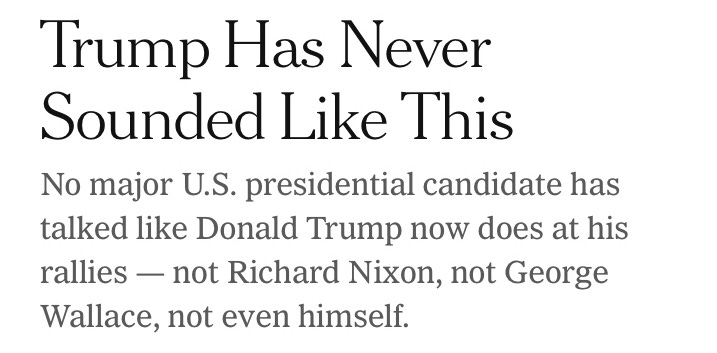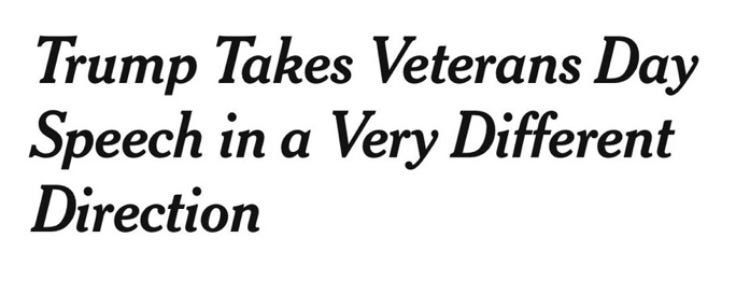Why headlines matter and news outlets fail at them
Out of laziness or fear, some media think small with the big type
David Pecker, the opening witness in Donald Trump’s first criminal trial, explained his top priority when he ran the National Enquirer:
“The only thing that is important is the cover of the magazine.”
Which means the most prominent headlines and photos.
Pecker understands the importance of headlines. Donald Trump does too. That’s why Trump arranged for Pecker’s slimy rag to write headlines during the 2016 campaign such as:
“CRUZ’S 5 SECRET MISTRESSES!”
(with a subhead reading “IT’S OVER FOR PERVY TED”)
and
“HILLARY: 6 MONTHS TO LIVE!”
The dubious claims behind the headlines didn’t matter. The headlines mattered.
That’s because a lot of people don’t read the stories. They’re what we call in the business “scanning readers.” They read the headlines and maybe the captions and occasionally the first paragraph and even more occasionally the rest of the story. This doesn’t make them bad people. We all scan headlines, think we’ve learned something, and move on without reading the actual story. In fact, most people who share links on Twitter/X don’t even open the link they’re sharing.
Reporters hate to think people are not getting to that great quote in the 12th paragraph of their story. But they’re not.
Which is why it’s a problem when mainstream media often fail to make the most of their headlines. Sometimes they take the lazy way out and repeat what people say, even when the people are known liars. Other times they seem to know the power of headlines but are afraid of it – and for that reason write vague, evasive and cowardly headlines.
An example of handing over a headline to a liar occurred with a particularly outrageous National Enquirer story from 2016 headlined, “TED CRUZ FATHER LINKED TO JFK ASSASSINATION!”
Last week Pecker testified that the Enquirer doctored a photo to make it seem as if Cruz’s father was in league with Lee Harvey Oswald. After the Enquirer published it in 2016, Trump cited the Enquirer and tried to exploit the smear further. And the New York Times, Washington Post and Politico helped him, even though the Cruz campaign had denied it.
The New York Times wrote a straight-news headline with no denial:
The story itself was as bad or worse, putting Cruz’s denial in the seventh paragraph. The Post wrote a similar straight headline with no denial:
The Post’s story did slightly better than the Times but not nearly good enough, putting the denial in the third sentence of the third paragraph. Politico published a similar headline:
Clearly, this was standard operating procedure in political journalism even though Trump was obviously pushing a hoax. Politico’s story put the Cruz denial in the second paragraph.
Trump got the headline he wanted, as he often has. I used to give the media the benefit of the doubt and assume they had foolishly handed over the task of headline writing to their least inexperienced editors. Increasingly, though, it seems as if some news outlets grasp the impact of headlines but have responded poorly. They know headlines are especially sensitive, so they make them especially meaningless. The New York Times is a leading offender.
When the New York Times wrote a detailed story about “plans by Mr. Trump and his allies that would upend core elements of American governance, democracy, foreign policy and the rule of law,” this generic headline appeared above it:
When the Times published a major piece last weekend on Trump’s ever-more-extreme rhetoric, raising the question of whether “fascist” or “wannabe fascist” was the better description for him, the newspaper sanded down its sharp point with this head-scratching headline treatment:
When the Times fact-checked Trump’s remarks about his trial in another story over the weekend, the paper wrote a headline that masked its conclusion – that Trump repeatedly made false statements:
That headline was the equivalent of a sports headline in which the Times declared that “We Covered the Knicks Game” but did not disclose who won.
For me, the headline that broke the Times vague-o-meter was the one below, which I’ve cited in the past. Last November, Trump used Nazi-style rhetoric that labeled his opponents as “vermin,” and the first version of the Times headline was this:
I don’t mean to pick on the New York Times, even though it’s the country’s most influential newspaper and writes a lot of terrible headlines. Other mainstream journalists also are missing an important point about mass communication.
I got into a social media skirmish recently with Jonathan Martin, Politico’s senior political columnist, who seems to think the New York Times’ headlines don’t matter.
When the Times wrote a story on abortion politics that called Trump and Joe Biden “two imperfect messengers,” I posted it on Twitter/X with this comment: “The New York Times is determined to both-sides us into a MAGA dictatorship.”
Martin mocked my tweet by posting sarcastically: “It’s true, low info voters in the WOW counties will make their ultimate decision from NYT headlines.”
The “WOW counties” are Waukesha, Ozaukee and Washington counties in Wisconsin. Martin’s point was that Midwestern voters who aren’t news junkies won’t be swayed by the Times’ headlines. But they can be, either directly or indirectly. The Times frames issues in ways that other publications adopt. And whether the people in the WOW counties are Times subscribers or not, they might see its headlines on social media. Mainstream media’s interpretations of the news influence the national mindset. Obviously.
I posted a screenshot of my initial exchange with Martin, tagging him, and we went back and forth a bit more. Others weighed in. It just seemed odd to me – and to several others – for a journalist to argue that headlines in a major national publication don’t matter.
Maybe Martin needs to have a talk with David Pecker.












for the same reason, MSM keeps calling the Manhattan trial a hush money trial. It’s not a hush money trial, it’s a business records fraud trial. The fact that almost every headline includes the phrase, hush money, minimizes the importance and the severity of the case.
In yesterday’s NYT, front page, above the fold was this headline. “Sharp reversals of climate rules hinder economy”.
This, to me, is a perfect example of what you are talking about. From the headline the inference would be that Biden is hurting the economy.